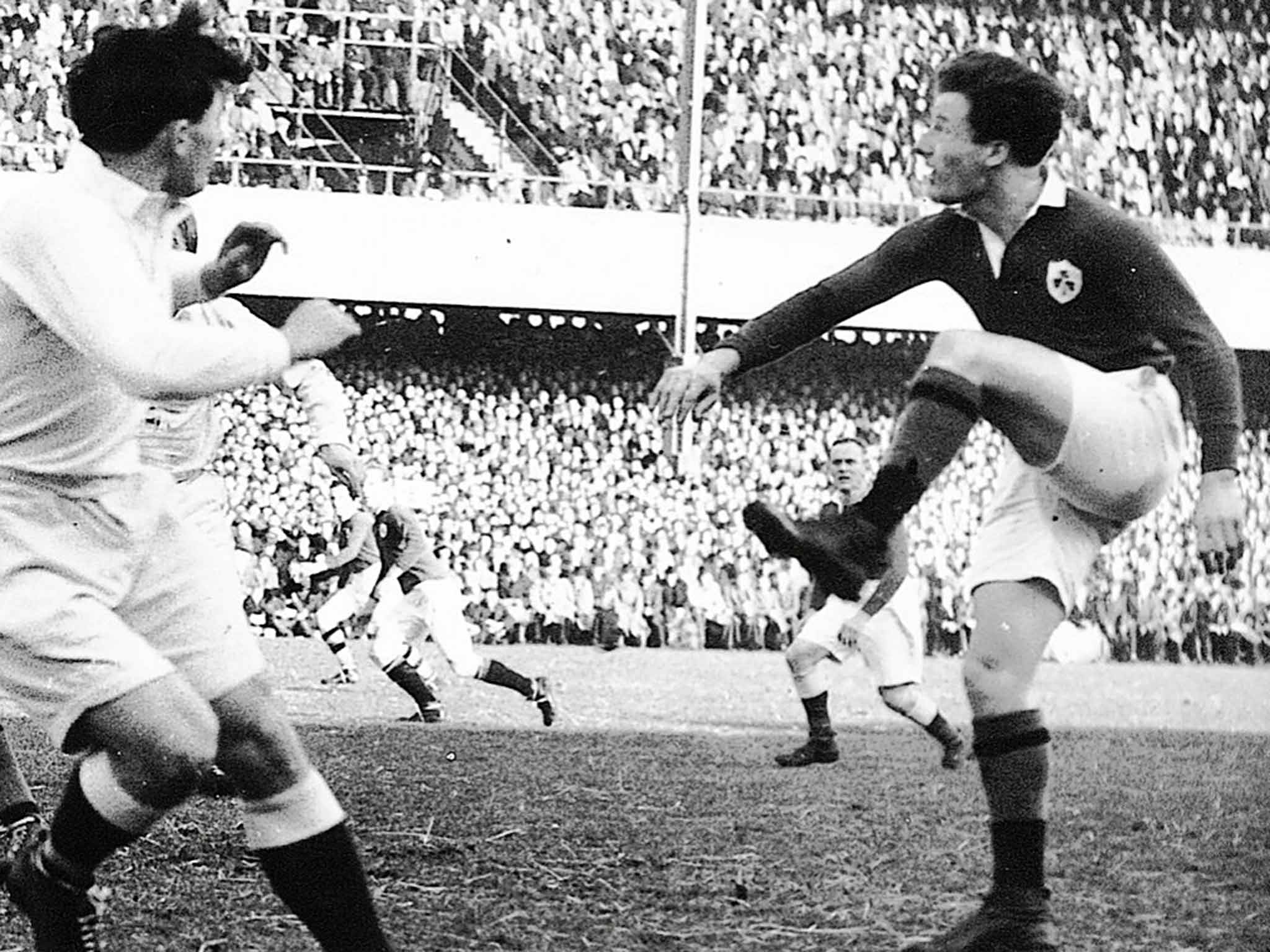Jack Kyle: Doctor and rugby international hailed as Ireland's greatest player who spent 34 years working in a hospital in Zambia

A Welsh story testifies to the standing of Jack Kyle among rugby union aficionados. It tells of a group of friends debating the greatest ever outside-half, each citing a Welsh star and his main attribute.
One remains silent, but finally speaks. "But there was one who could sidestep like Phil Bennett, ghost like Barry John, break and kick like Cliff Morgan, swerve like Jonathan Davies and tackle like Neil Jenkins."
"Who was that ?"
"Jackie Kyle."
Kyle, voted Ireland's greatest player in a poll in 2002, was the emblematic figure of what was until recent years their most successful period. He was outside-half and tactical ringmaster when Ireland won their first (and until 2009 their only) Grand Slam in 1948, followed by a Triple Crown and championship in 1949 and another title in 1951. In 1950 he played all six Tests on the British and Irish Lions tour of Australia and New Zealand and was named one of the New Zealand Rugby Almanac's six players of the year. Karl Mullen, captain of Ireland and the Lions, called him "the genius and inspiration" of his teams, while the Irish journalist Ned van Esbeck reckoned him "the ideal man to play to the strengths of the team and conceal their weaknesses."
Those four years, during which he also completed his medical studies at Queen's University, Belfast, graduating in 1951, were the mid-point of a formidably long career. He emerged, with typically impeccable timing, as the Second World War ended. He was a 19-year-old not long out of Belfast Royal Academy when he was picked to play for an Ireland XV against the British Army at Ravenhill Road, Belfast in December 1945.
Kyle played in the non-cap "Victory" internationals against France and England, and once the Five Nations resumed in 1947 was a fixture – unless injured, which he rarely was – until 1958. His 46 caps were then regarded as an all-time record, France's award of caps against Romania, Italy and Argentina not being accepted elsewhere, and with his Lions appearances made him the first man to play 50 Tests against the major nations. He scored nine tries, including two for the Lions and captained Ireland six times. Created OBE in 1959, he played club rugby until 1963.
His brilliance was testified to by his contemporaries. Bleddyn Williams, a 1950 Lions colleague who spent years as a team-mate for Cardiff and Wales of the vividly gifted Cliff Morgan, said Kyle was "the best stand-off I ever played behind." Morgan himself credited Kyle with "wisdom which enabled him instantly to take in every factor of the game."
Kyle fascinated the New Zealand full-back Bob Scott, with South African back rower Hennie Muller his chief rival as the outstanding player of the first postwar decade. Scott called him a genius, and wrote: "The people who looked for the obvious were disappointed with him; those who looked at his contribution to the team, to his footballing instinct, were amazed by his abilities."
Kyle could dazzle, as he did in scoring in 1953 against France with a "fiesta of side-steps" which had even his opponents applauding and the Irish writer Paul McWeeney pastiching the rhyme about the Scarlet Pimpernel. But it was the understated quality identified by Scott, memorably described by Frank Keating as "a patience for the perfect moment, even if it came just once a match", which made him most dangerous. Morgan found out the hard way on his Wales debut in 1951: "Just when I had been lulled into a false sense of security, Jack suddenly took off and went past to score a try which saved the game."
Kyle was quiet and modest. He claimed, in outright contradiction of both Scott and van Esbeck, to have been "not a great tackler", and he credited Ireland's defensive excellence to an outstanding back row and his inside centre (and brother-in-law) Noel Henderson.
He was a highly literate, quietly religious man who enchanted the New Zealand writer Terry McLean by taking The Rubaiyat of Omar Khayyam on the 1950 Lions tour and debated the works of WB Yeats and Patrick Kavanagh with his Irish team-mate Des O'Brien. No compliment pleased him more than when the poet Louis MacNeice remarked that if he had one wish it would be "to play rugby like Jackie Kyle."
Those tastes reflected a hinterland which was also demonstrated in a letter to the Irish Times in 1967 condemning Ian Paisley, an almost exact Ulster contemporary, for "sowing seeds that create evil from which springs despicable action", and still more in a medical career spent largely in the developing world.
He worked briefly in Indonesia, then from 1966 until his retirement in 2000 at Chingola in Zambia, until 1991 the only surgeon in a 500-bed hospital. He likened his role to "an old country surgeon in rural Ireland 60 years ago, everything from tonsils, appendices and broken limbs to operations much more dramatic and desperate."
His marriage to Shirley Anderson, with whom he had a son and a daughter, ended in divorce. In retirement he remained, as one interviewer found only a few weeks ago, engaging and sharp-witted. That there is no full-length memoir of, or by, him reflects a playing prime before such books became the norm, but that gap was at least partly filled by the recent publication by his daughter, Justine Kyle McGrath, of Conversations with My Father.
John Wilson Kyle, rugby union player and doctor: born Belfast 10 January 1926; OBE 1959; married Shirley Anderson (marriage dissolved; died 2009; one daughter, one son); died County Down 27 November 2014.
Subscribe to Independent Premium to bookmark this article
Want to bookmark your favourite articles and stories to read or reference later? Start your Independent Premium subscription today.

Join our commenting forum
Join thought-provoking conversations, follow other Independent readers and see their replies